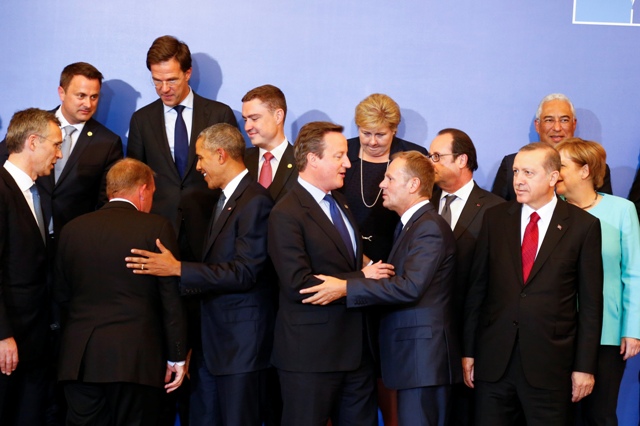US, EU urged to impose costs for sea rules violations
MANILA, Philippines — The European Union and the United States should impose costs for violations of maritime rules amid disputes over the South China Sea, a group of analysts said.
In a recent policy report, experts at the Washington-based think tank Center for Strategic and International Studies said that by initiating consultation to impose penalties, the EU and the US can reinforce international law and reassert their rebalancing policies toward the Asia-Pacific.
"Should violations of international maritime law continue and if maritime disputes are settled by force in the South China Sea, there should be a discussion of joint efforts to impose costs on the parties that violate international law," said Heather Conley, James Mina and Phuong Nguyen, authors of "A Rebalanced Transatlantic Policy toward the Asia-Pacific."
The report noted that the potential move can strengthen US-EU security cooperation in the increasingly influential region.
Before an international tribunal under the United Nations, the Philippines accused China of violating the international sea convention with its dredging, reclamation and construction of islands over disputed reefs. US officials have expressed concern over Beijing's assertive behavior that risks freedom of navigation and overflight while insisting on Washington's neutrality over the sea row.
The ruling on the Philippines's case under the UN Convention on the Law of the Sea questioning China's expansive nine-dash line claims is expected on Tuesday.
The analysts said both the US and the EU, despite having some diverging policies toward the Asia-Pacific, will benefit from a common expression of security vision in the region.
"Both (the US and EU) stand to gain that the region's institutional architecture is strengthened in the economic and security spheres that the Asia-Pacific region remains stable, predictable, peaceful and conducive to trade and investment," the report said.
The two players should also work with the Association of Southeast Asian Nations on the completion of a binding code of conduct over the maritime lane. They could also consider "trilateralizing" cooperation on a rules-based approach.
"EU interlocuters should be invited as observers to US-ASEAN meetings with participation in supporting the development of regional institutional architecture and strengthening legal norms," the report said.

Leaders of member-states at the NATO summit in Poland on July 8, 2016 prepare for their traditional group photo. EU/Released
Another important opportunity to launch the partners' emerging transatlantic policy is the upcoming decision of the Permanent Court of Arbitration in the Hague.
READ: Hague ruling a chance for EU, US to show solidarity, experts say
The United States, however, has not ratified the United Nations Convention on the Law of the Sea despite having advocated a rules-based order.
Ernest Bower, a top policy expert on Southeast Asia, said that the US has a "big country disease" making it hesitant to commit to sovereign legal processes.
US President Barack Obama urged the Republican-led US Congress to ratify the convention—a move seen to boost US credibility in pushing for its interests in Asia-Pacific amid the sea row—but has not been successful.
"Legislators... have a local, me-first, small view of the world (given the priorities) of constituents under them," Bower said at a forum in Manila last month.
- Latest
- Trending






























